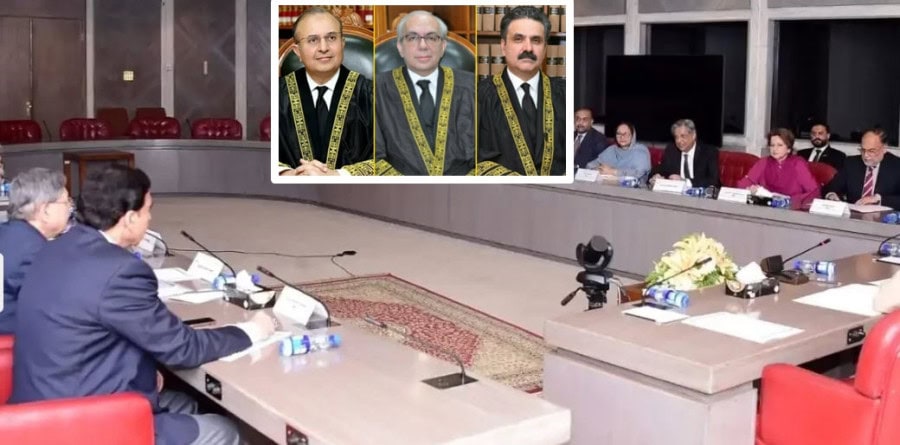Parliamentary Committee
ISLAMABAD: The 12-member Special Parliamentary Committee, established for the first time in Pakistan’s history to appoint the Chief Justice of Pakistan (CJP), held its inaugural meeting on Tuesday at the Parliament House. This marks a significant shift in the country’s judicial appointment process, following recent changes in the law.
The meeting took place behind closed doors in room no. 5 of the Parliament House and included both government and opposition members.
However, the opposition Pakistan Tehreek-e-Insaf (PTI)-backed Sunni Ittehad Council (SIC) members opted not to attend the session. Their absence led to the decision to reconvene the committee later the same evening at 8:30 pm to continue the discussion.
Following the first round of the meeting, Law Minister Azam Nazeer Tarar spoke to journalists, noting that nine members of the Special Parliamentary Committee were present.
Despite the absence of the SIC members, the minister confirmed that the quorum was met and the proceedings would not be halted. “We are democratic-minded people, and the beauty of democracy is to unite everyone,” Tarar remarked, emphasizing the government’s willingness to engage with the opposition.
To address the absence of the SIC members, four committee members were tasked with visiting the PTI-SIC lawmakers’ chambers to encourage them to reconsider their decision and participate in the next meeting.
The urgency of the situation is underscored by the impending retirement of the current CJP, Qazi Faez Isa, on October 25. The government must appoint a new top judge before that date.
Previously, under the old law, the senior puisne judge would have automatically replaced the retiring CJP. In this case, Justice Mansoor Ali Shah was next in line. However, with the enactment of the 26th Constitutional Amendment Bill, the process has changed.
The amendment to clause 3 of Article 175A requires the new Chief Justice to be appointed on the recommendation of the Special Parliamentary Committee, which must choose from the three most senior judges of the Supreme Court.
The committee’s decision requires a two-thirds majority. Besides Justice Mansoor Ali Shah, the other two judges under consideration are Justice Munib Akhtar and Justice Yahya Afridi.
The Special Parliamentary Committee consists of key political figures, including Senators Azam Nazeer Tarar from the Pakistan Muslim League-Nawaz (PMLN), Farooq H Naek from the Pakistan Peoples Party (PPP), Syed Ali Zafar from PTI, and Kamran Murtaza from Jamiat Ulema-e-Islam-Fazl (JUI-F).
From the National Assembly, members include Khawaja Asif, Ahsan Iqbal, and Shaista Parvez from PMLN, Raana Ansar from Muttahida Qaumi Movement-Pakistan (MQM-P), Syed Naveed Qamar and Raja Pervez Ashraf from PPP, and Barrister Gohar Ali Khan and Sahibzada Hamid Raza from the SIC.
The appointment process must be completed within the next three days, as mandated by clause 3C of Article 175A, which requires the committee to send a nomination with a two-thirds majority at least three days before the retirement of the current Chief Justice. If the nominee declines, the remaining judges from the three most senior judges will be considered.
This new process of appointing the Chief Justice represents a significant change in Pakistan’s judiciary, making the role of the parliamentary committee critical in determining the future leadership of the country’s highest court.
I am a dynamic professional, specializing in Peace and Conflict Studies, Conflict Management and Resolution, and International Relations. My expertise is particularly focused on South Asian Conflicts and the intricacies of the Indian Ocean and Asia Pacific Politics. With my skills as a Content Writer, I serve as a bridge between academia and the public, translating complex global issues into accessible narratives. My passion for fostering understanding and cooperation on the national and international stage drives me to make meaningful contributions to peace and global discourse.










